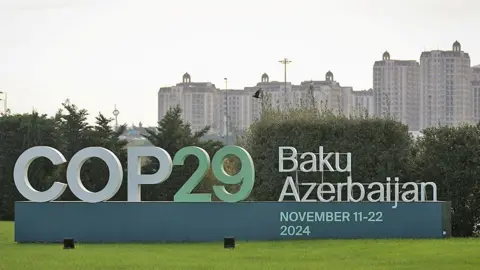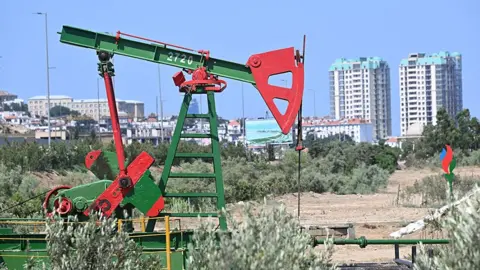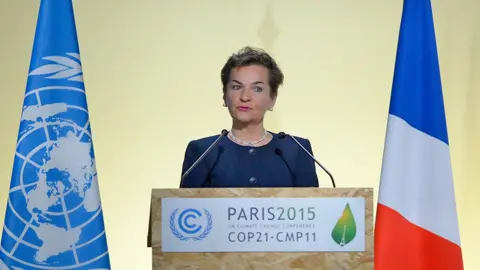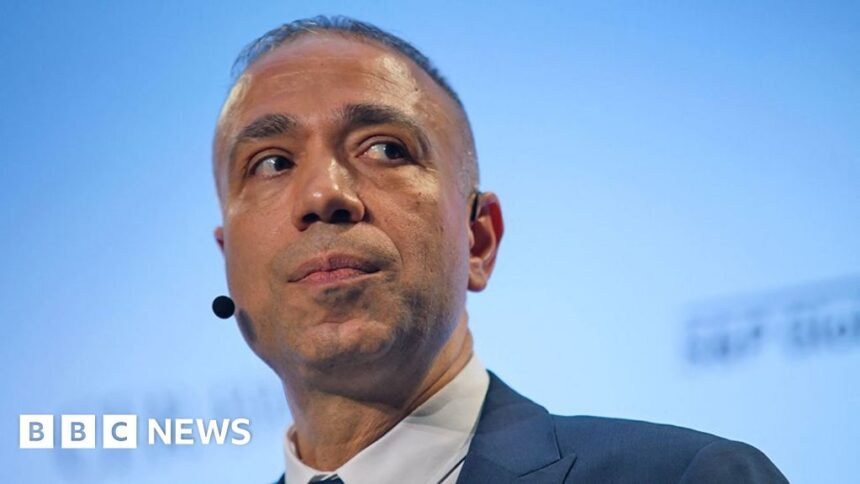At the COP29 climate change conference in Azerbaijan, a senior official appeared to have used his position to arrange a meeting to discuss a potential fossil fuel deal, according to the BBC.
A secret recording shows Elnur Soltanov, chief executive of Azerbaijan’s COP29 team, discussing “investment opportunities” in the state-run oil and gas company with a man posing as a potential investor.
“We have a lot of natural gas fields to develop,” he said.
The former head of the UN agency responsible for climate negotiations told the BBC that Soltanov’s behavior was “totally unacceptable” and a “betrayal” of the COP process.
 Reuters
ReutersSoltanov is not only the CEO of COP29, he is also the Deputy Minister of Energy of Azerbaijan and a member of Socar’s board of directors.
Azerbaijan’s COP29 team has not yet responded to a request for comment.
U.S. data show that oil and natural gas account for about half of Azerbaijan’s economy and more than 90% of its exports.
COP29, the 29th annual United Nations climate summit, will kick off in Baku on Monday, where governments will discuss how to limit and combat climate change and raise global ambition to tackle the problem.
However, this is the second year in a row that the BBC Suspected misconduct revealed by the host government.
The BBC has seen documents and secret videos produced by human rights group Global Witness.
It is understood that one of its representatives approached the COP29 team posing as the head of a fictional Hong Kong energy investment company.
He said the company was interested in sponsoring the COP29 summit but wanted to discuss investment opportunities in Azerbaijan’s state-owned energy company Socar in return. An online meeting with Soltanov was arranged.
 Getty Images
Getty ImagesDuring the meeting, Soltanov told potential sponsors that the goal of the meeting was to “solve the climate crisis” and “move away from hydrocarbons in a just, orderly and equitable way.”
He said anyone, including oil and gas companies, “can come up with solutions” because Azerbaijan’s “doors are open”.
However, he said he was also open to discussing deals, including oil and gas deals.
Initially, Soltanov said potential sponsors might be interested in investing in some of the “green transition projects” in which Socar is involved, but then spoke of opportunities related to Azerbaijan’s plans to increase gas production, including new pipeline infrastructure.
“There are many joint ventures that can be established,” Soltanov said in the recording. “Socar trades oil and gas around the world, including in Asia.”
Soltanov later described natural gas as a “transitional fuel”, adding: “We will produce a certain amount of oil and gas, maybe forever.”
The United Nations’ climate science body, the Intergovernmental Panel on Climate Change, acknowledges that some oil and gas will play a role by 2050 and beyond. However, it is clear that “developing… new oil and gas fields is incompatible with limiting warming to 1.5 degrees Celsius”.
It also goes against the agreement the world reached at the last global climate summit to transition away from fossil fuels.
Soltanov seemed eager to help with the discussion, telling potential sponsors: “I’d love to make a connection between your team and their team. [Socar] so that they can start a discussion.
A few weeks later, the fake Hong Kong investment firm received an email – a tip Socar wanted to follow up on.
Attempting to engage in commercial transactions as part of the COP process appears to be a serious breach of the standards of conduct for COP officials.
The purpose of these campaigns should be to reduce the world’s use of fossil fuels—the main driver of climate change—rather than to increase sales.
These standards are set by the United Nations Framework Convention on Climate Change (UNFCCC), the United Nations body responsible for climate negotiations.
The United Nations said it could not comment directly on our findings, but said “the same rigorous standards” apply to conference organizers and that they reflect “the importance of impartiality for all presiding officials.”
Its code of conduct for COP officials states that they “shall act strictly on the basis of sound, independent and impartial judgment and without bias, bias, favoritism, caprice, self-interest, preference or deference.”
“They should also ensure that personal views and beliefs do not undermine or appear to undermine their role and functions as UNFCCC officials.”
 Getty Images
Getty ImagesChristiana Figueres oversaw the signing of the 2015 Paris Agreement, which aimed to limit global temperature rise to well below 2 degrees Celsius.
She said such behavior was “contrary to the purpose” of the Conference of the Parties and a “betrayal” of the process.
The BBC has also seen emails between the COP29 team and fake investors.
In one chain, the team discussed a $600,000 (£462,000) sponsorship deal with a fake company in exchange for an introduction to Socar and participation in an event on “sustainable oil and gas investment” during COP29.
Officials provided five passes with full access to the summit and drafted a contract that initially required the company to make some commitments to sustainability. It then reversed, with one claim abandoned and a “correction” considered for another.
The BBC requested comment from the Azerbaijan COP29 team and Socar. Neither responded to those requests.
The findings come a year after the BBC obtained leaked documents showing the UAE planned to use its role as COP28 host to seal oil and gas deals.
COP28 saw the first agreement on the need to move away from fossil fuels.


